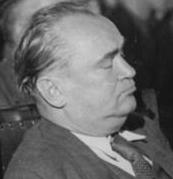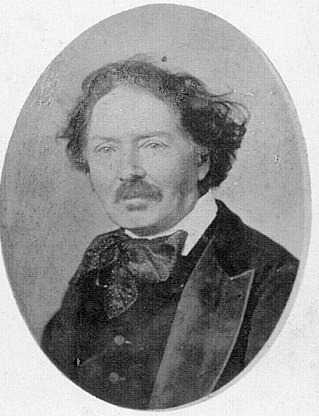Related Research Articles

The Lithuanian Soviet Socialist Republic, also known as Soviet Lithuania or simply Lithuania, was de facto one of the constituent republics of the Soviet Union between 1940–1941 and 1944–1990. After 1946, its territory and borders mirrored those of today's Republic of Lithuania, with the exception of minor adjustments of the border with Belarus.

Edvardas Gudavičius was a Lithuanian historian. He was known as one of the best historians in Lithuania specializing in the early history of Grand Duchy of Lithuania and is an author of many publications.

The Communist Party of Lithuania and Byelorussia also known as the Communist Party (Bolsheviks) of Lithuania and Byelorussia, was a communist party which governed the short-lived Socialist Soviet Republic of Lithuania and Byelorussia in 1919. The Central Committee of the party had the status of a regional committee within the Russian Communist Party (Bolsheviks). Following the loss of Lithuania and Byelorussia to Polish forces in the Polish-Soviet war, the party organized partisan units behind the front lines. In September 1920 the party was disbanded into the Communist Party of Lithuania and the Communist Party (Bolsheviks) of Byelorussia.

Kurt Bürger was a German politician.

Friedrich Wilhelm German Mäurer was a German Communist writer and leader of the early German labor movement. He joined the League of Outlaws because of his democratic beliefs. When the League of Outlaws became the League of the Just, Mäurer became a member of the League of the Just. He wrote poetry for its newsletters and several books, and with Moses Hess was an important link between it and Karl Marx.
The double genocide theory alleges that two genocides of equal severity occurred in Eastern Europe, that of the Holocaust against Jews perpetrated by the Nazis and an alleged second genocide that the Soviet Union committed against local populations in Eastern Europe. The theory first became popular in post-Soviet Lithuania, in discussions about the Holocaust in Lithuania. A more explicitly antisemitic version of the theory accuses Jews of complicity in Soviet repression and characterizes local participation in the Holocaust as retaliation, especially in Lithuania, eastern Poland, and northern Romania. Double genocide theory has been criticized by scholars as a form of Holocaust trivialization.
Zibn teg was a weekly Yiddish literary newspaper, published in Wilno in 1935 and the spring of 1936. The newspaper was similar to the banned publication Fraynd, and was printed at the same printing house in Wilno. The Polish authorities labelled Zibn teg 'crypto-communist'.
Bruno Kaiser was a Marxist scholar of German studies who became a journalist and, during the Nazi period, a resistance activist. In his later years he became, in addition, a distinguished librarian.
Icikas Meskupas pseudonym Adomas was a leader of the Lithuanian Komsomol and Communist Party in interwar Lithuania. He was elected to the People's Seimas and the Supreme Soviet of the Soviet Union. He became the second secretary of the party in February 1941. For his communist activities, he was arrested and imprisoned several times by Lithuania and once by Nazi Germany. During World War II, he joined Soviet partisans and was killed in a shootout with Lithuanian police.

Der Veker was a Yiddish language newspaper published from Minsk 1917–1941. Initially a Bundist publication founded in the midst of the 1917 revolutions, it continued publishing as a Communist Party organ until 1925.
Undzer shtime was a Yiddish language newspaper published in Vilna in 1918–1920. It was published monthly from August to November of 1918, but became a daily on December 6, 1918, as the German army was retreating out of the city. The newspaper was the organ of the Lithuania Regional Committee of the General Jewish Labour Bund in Lithuania, Poland and Russia. Max Weinreich was the editor of Undzer shtime from December 1918 until mid-May 1919. He was succeeded by Paul Novick.
Weg und Ziel was a monthly Marxist–Leninist theoretical journal which was affiliated with the Communist Party of Austria. The journal was published in Vienna in the period 1935–2000. Its subtitle was Monatsschrift für Theorie und Praxis des Marxismus-Leninismus.
The Kaunas Soviet of Workers Deputies was a soviet (council) in Kaunas/Kovno that sought to act as a communist government for the city and its surroundings. The Kaunas Soviet functioned between 18 December 1918 and 13 January 1919, but was disbanded in the wake of the defeat of the Spartacist Uprising in Germany.
Die Völkerfreiheit was a German language newspaper published from Kiev between 31 May 1919 and August 1919. Die Völkerfreiheit was a continuation of Weltkommune, a German-language communist publication which had been founded in Kharkov in late 1918.
The Lithuanian People's Aid Union, also known as Lithuanian Red Aid before 1940, was an organization in Lithuania active from end of 1918 to June 1941. The organization was commonly referred to as 'MOPR' per the Russian acronym of its international counterpart, the International Red Aid. The Lithuanian Red Aid movement raised funds and donated money, food, clothes and shoes to imprisoned communists. Just like the Communist Party of Lithuania, the Lithuanian Red Aid was illegal in Lithuania during the interwar period.
Yankef Vaynshteyn was a Jewish socialist leader in Lithuania. He was born in 1897. As of 1918, he was the chairman of the Vilna organization of the General Jewish Labour Bund in Lithuania, Poland and Russia. When the Vilna Soviet of Workers Deputies was constituted on December 15, 1918, Vaynshteyn was elected as deputy chairman of the presidium of the Soviet.
Nisn Pups was a Soviet Lithuanian-Jewish revolutionary, journalist, publicist and trade unionist. He was known by the party name Meyer Ziv from 1921 onwards. In some periods he used combinations of his birth name and party name, going by Meir Pups.

Sergey Vladimirovich Girinis, until 1919 known as Raul Isaakovich Ginzburg, was a Soviet revolutionary, journalist and trade unionist. He was a leading figure in the labour movement in Vilna (Vilnius) in the 1910s, adhering to a Menshevik-Internationalist line. He later joined the Communist Party of Lithuania. After a prisoner exchange, he was based in Moscow and represented Lithuanian trade unions in the Red International of Labour Unions (Profintern). Girinis was a prolific writer, authoring different works on political theory and history.

Chaimas Kaplanas was a Lithuanian-Jewish communist revolutionary. Kaplanas held key leadership roles in the Communist Party of Lithuania in the 1920s, but was left out of the party leadership in 1927.
Proletarisher signal was a Yiddish-language publication printed in Kaunas, Lithuania from 1925 to 1926. It was an organ of the Kaunas District Committee of the underground Communist Party of Lithuania. The publication was edited by Chaimas Kaplanas and Borisas Galperinas.
References
- ↑ National Library of Russia. Yiddish Newspapers (in the Latin alphabet)
- ↑ Rosen, Josif. Kaunas (cont.)
- ↑ Lietuvos Istorijos Studijos. Archyvai (1 Tomas)
- ↑ Estraikh, Gennady. The Yiddish-Language Communist Press , in Frankel, Jonathan (ed.), Studies in Contemporary Jewry. Vol. 20, Dark Times, Dire Decisions : Jews and Communism. New York City: Oxford University Press, 2005. p. 67
- ↑ Šarmaitis, R. Lietuvos Komunistų partijos istorijos apybraiža. Vilnius: Mintis, 1971. p. 200
- ↑ Institut für Marxismus-Leninismus beim ZK der SED., and Sozialistische Einheitspartei Deutschlands. Beiträge zur Geschichte der deutschen Arbeiterbewegung . Berlin: Institut für Marxismus-Leninismus], 1959. p. 891